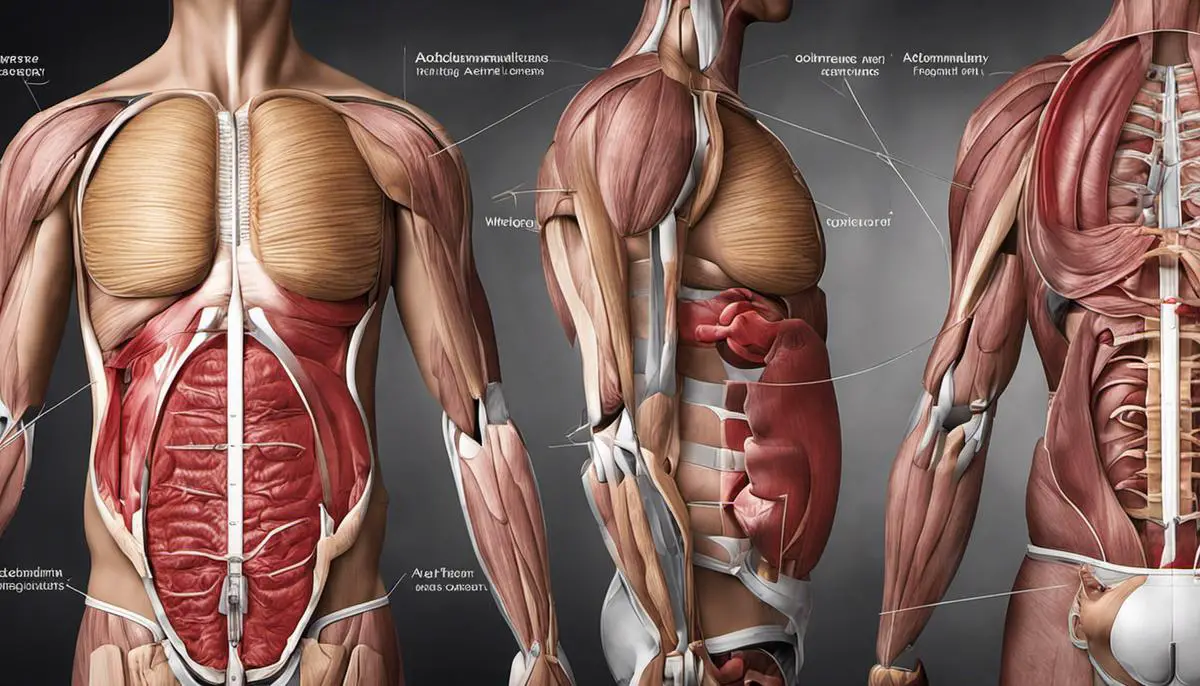Abdominal swelling, a common occurrence within a variety of contexts, can range in severity from mild discomfort to indicative of serious underlying health issues. Typically affecting the area between the chest and the groin, abdominal swelling presents itself in a multitude of facets. This multifaceted condition is perhaps what has stoked curiosity in the minds of the general public, urging them to understand and decode its mysteries. To cater to this curiosity, this comprehensive primer would seek to demystify abdominal swelling in all its breadth and depth. This would help in crafting a lucid understanding of abdominal swelling, its symptoms, causes, and the range of treatment options available.
Overview of Abdominal Swelling
Abdominal Swelling: A Comprehensive Overview
Characterized by an increase in the size of the stomach or belly, abdominal swelling, often referred to as bloating or distention, is a condition frequently associated with a buildup of gas, solid or liquid substances in the abdomen. It can sometimes cause noticeable discomfort or even pain, given that the abdomen appears larger than its normal size due to this condition.
The abdomen, housing a multitude of organs like the liver, stomach, gallbladder, kidneys, appendix, pancreas, and both the small and large intestines, as well as the spleen and reproductive organs in females, offers countless opportunities for issues which could trigger abdominal swelling. For example, disorders affecting the kidneys or liver could result in fluid retention and consequently, abdominal bloating, while digestive issues such as constipation could cause a gas or feces buildup.
It’s also worth noting that some conditions causing abdominal swelling might not directly affect the organs within the abdomen. Conditions like congestive heart failure or cancer, for instance, can cause widespread retention of fluid leading to abdominal swelling.
However, not all occurrences of abdominal swelling are attributable to serious conditions. Sometimes, overeating or indulging in foods that produce gas could lead to abdominal bloating, which typically subsides naturally over time.
Abdominal swelling symptoms can differ significantly from person to person, often depending on the root cause of the swelling. Common symptoms include a feeling of fullness or tightness in the abdomen, discomfort or pain, difficulty breathing or shortness of breath, and an increase in abdominal size. Some people might also experience ancillary symptoms like heartburn, acid reflux, changes in bowel movements or bloating.
While some instances of abdominal swelling can be harmless and fleeting, it’s of utmost importance to consult a healthcare professional if you’re experiencing new, persistent or worsening abdominal swelling. This is especially important if other symptoms such as weight loss, nausea, vomiting or pain, accompany the swelling. These could potentially indicate serious underlying conditions requiring immediate medical attention.

Common Symptoms of Abdominal Swelling
Digging Deeper into Abdominal Swelling Symptoms
Abdominal swelling is a common symptom experienced by many people. It’s not uncommon to notice an increased size in your stomach or abdomen, often accompanied by discomfort or pain. The reasons for such swelling can span a wide gamut, from relatively benign causes such as gastritis and food intolerance to more critical health conditions such as liver disease, and in severe cases, ovarian cancer.
Discomfort, Pain and Bloating
A significant symptom of abdominal swelling is a feeling of discomfort or pain in the abdomen. This discomfort may be mild or severe, sharp, or dull, and can sometimes be constant or come and go. The discomfort is usually a response to the stretching of the abdominal wall and the distention of the intestines.
Bloating refers to a sensation of fullness or tightness in the abdomen, usually due to gas or fluid accumulation. This sensation is often accompanied by visible swelling or distention. Bloating can be exacerbated by certain foods, such as beans, onions, broccoli, sprouts, and soft drinks, which are known to cause gas.
Changes in Bowel Movements
Changes in bowel movements are another common symptom. These can range from an increased frequency of bowel movements, to diarrhea, or even constipation. The consistency, shape, and color of stools may also change.
Nausea and Vomiting
Nausea and vomiting are also signs of abdominal swelling, especially when accompanied by other symptoms such as abdominal pain and bloating. These symptoms can be caused by various conditions such as gastroenteritis, food poisoning, or blockage in the intestine.
Unintended Weight Loss or Gain
Unintended weight loss or gain can also be a symptom of abdominal swelling. This can be due to a reduced appetite from the discomfort of bloating or from more serious causes like the growth of a mass. Increasing abdominal size without weight gain may indicate excess fluid accumulation, known as ascites.
Recognizing the Need for Medical Consultation
If you find yourself dealing with persistent or severe abdominal swelling, or if this symptom is accompanied by other worrisome signs such as intense abdominal pain, high fever, blood in your stool, unyielding nausea and vomiting, skin yellowing (jaundice), or unanticipated changes in weight, you should make it a priority to consult with a medical professional. In such cases, assessing the underlying condition causing your symptoms is of utmost importance.
Keep in mind, expertise in early diagnosis and effective treatment of the causes of abdominal swelling has the potential to prevent problematic complications and enhance your journey to better health.

Potential Causes of Abdominal Swelling
Understanding Abdominal Swelling: Symptoms and Potential Causes
Abdominal swelling may be a symptom of various conditions, ranging from simple issues like unhealthy dietary habits to serious health problems such as liver disease. One of the most common causes is an accumulation of excess fat caused by poor eating habits and sedentary lifestyle. This often results in a feeling of bloating or swelling in the stomach.
Similarly, gas formation is a common trigger for abdominal swelling. This tends to happen when one inadvertently swallows air while eating or drinking, or after eating certain foods like lentils, beans, broccoli, onions and others that tend to produce more gas.
Overeating is another common cause that can result in abdominal swelling, as forcibly stretching the stomach through excessive intake of food can cause temporary bloating.
Some gastrointestinal disorders such as indigestion, constipation, and gastroenteritis can cause abdominal swelling. Irritable bowel syndrome (IBS), characterized by variations in bowel movements and abdominal discomfort, often leads to symptoms like bloating and gas.
Furthermore, diseases affecting the ascending colon and rectum can lead to abdominal swelling. Infections, inflammatory conditions, and even malignancies in the colon and rectum may induce this symptom.
More serious conditions, like liver disease, can also lead to abdominal swelling, with cirrhosis- a scarring of the liver- often resulting in fluid accumulation in the abdomen, a condition known as ascites. Hepatitis and other liver diseases can cause similar effects.
Among other major health conditions, kidney disease is a significant factor in causing abdominal swelling. For instance, Polycystic kidney disease, which forms large cysts in the kidneys, can result in abdominal discomfort and distention.
In females, ovarian cysts and benign ovarian growths are often associated with abdominal swelling. Of specific concern, however, is ovarian cancer, which could present with similar symptoms. It is vital that women recognize the additional symptoms of ovarian cancer such as pelvic pain, anorexia (difficulty eating) and frequent urination to enable early detection and prompt treatment.
In conclusion, abdominal swelling can have a wide range of causes, from innocuous circumstances like overeating to severe medical conditions like liver diseases and ovarian cancer. Should one experience persistent, unexplained abdominal swelling, pursuing medical consultation immediately is of utmost importance.

Diagnosis and Treatment Options for Abdominal Swelling
Identifying the Cause: The Diagnosis of Abdominal Swelling
The identification process for the causes of abdominal swelling usually begins with a comprehensive review of the patient’s medical history and a physical examination. The healthcare provider may ask about the patient’s current symptoms, previous medical conditions, and lifestyle habits. Additionally, the doctor may perform a physical examination, which could involve palpating the abdomen to detect tenderness, firmness, or abnormal growths.
Diagnostic Tools for Abdominal Swelling
Following an initial consultation, if the cause of the swelling isn’t immediately apparent, the doctor may request various diagnostic tests. Imaging tests, such as X-rays, ultrasound, magnetic resonance imaging (MRI), and computed tomography (CT) scan may be used to get a visual of the abdomen’s condition. These tests help in detecting tumors, cysts, inflammation, enlargements, or other abnormalities that may cause abdominal swelling.
Laboratory tests also play a pivotal role in diagnosing the root cause of abdominal swelling. These can include complete blood count (CBC), liver function tests, kidney function tests, and tests for gastrointestinal diseases, such as Helicobacter Pylori (H. Pylori) antigen test and stool tests.
Moreover, a doctor may also choose to conduct endoscopic procedures such as upper endoscopy, colonoscopy or laparoscopy to visualize the digestive tract or the abdominal cavity. These procedures help detect ulcers, blockages, or abnormal growths that might be causing the abdominal swelling.
Treatment Options for Abdominal Swelling
The treatment of abdominal swelling largely depends on pinpointing the underlying cause. For instance, gastrointestinal issues caused by diet can often be resolved through dietary changes, medication, and sometimes, probiotics that help maintain a healthier gut flora. Over-the-counter anti-gas, anti-acidity, or anti-diarrhea medication may also be recommended for temporary relief.
If the swelling is due to fluid buildup or ascites, diuretics (water pills), low-sodium diet, as well as procedures to drain the fluid may be employed. In severe cases, where malignancies or cysts are detected, surgical interventions or chemotherapy might be required.
If liver disease is identified as the cause, treatment could range from lifestyle changes such as reducing consumption of alcohol and losing weight to more intense treatments such as liver transplant. Similarly, if kidney disease is the cause, treatments can range from medication, low-protein diets to dialysis or a kidney transplant in severe instances.
Inflammatory conditions like Crohn’s disease or ulcerative colitis often require a combination of dietary management, medication, and potentially surgical interventions.
In all cases, it’s vital to note that early detection and prompt treatment are key to better prognosis and management of abdominal swelling.

Understanding the canvas of abdominal swelling, its potential symptoms, and its potential causes can greatly alleviate the uncertainty one feels when experiencing stomach discomfort. By demystifying the condition, this discussion has attempted to empower you to navigate such situations astutely, cognizant of when medical intervention is necessary. Furthermore, a nuanced insight into the diagnostic tools and treatment options available contributes to strengthening one’s knowledge arsenal. It is hoped that this primer has proven helpful in providing a comprehensive understanding of abdominal swelling, thus assisting in mitigating fears or anxieties and promoting informed decision-making regarding healthcare.
